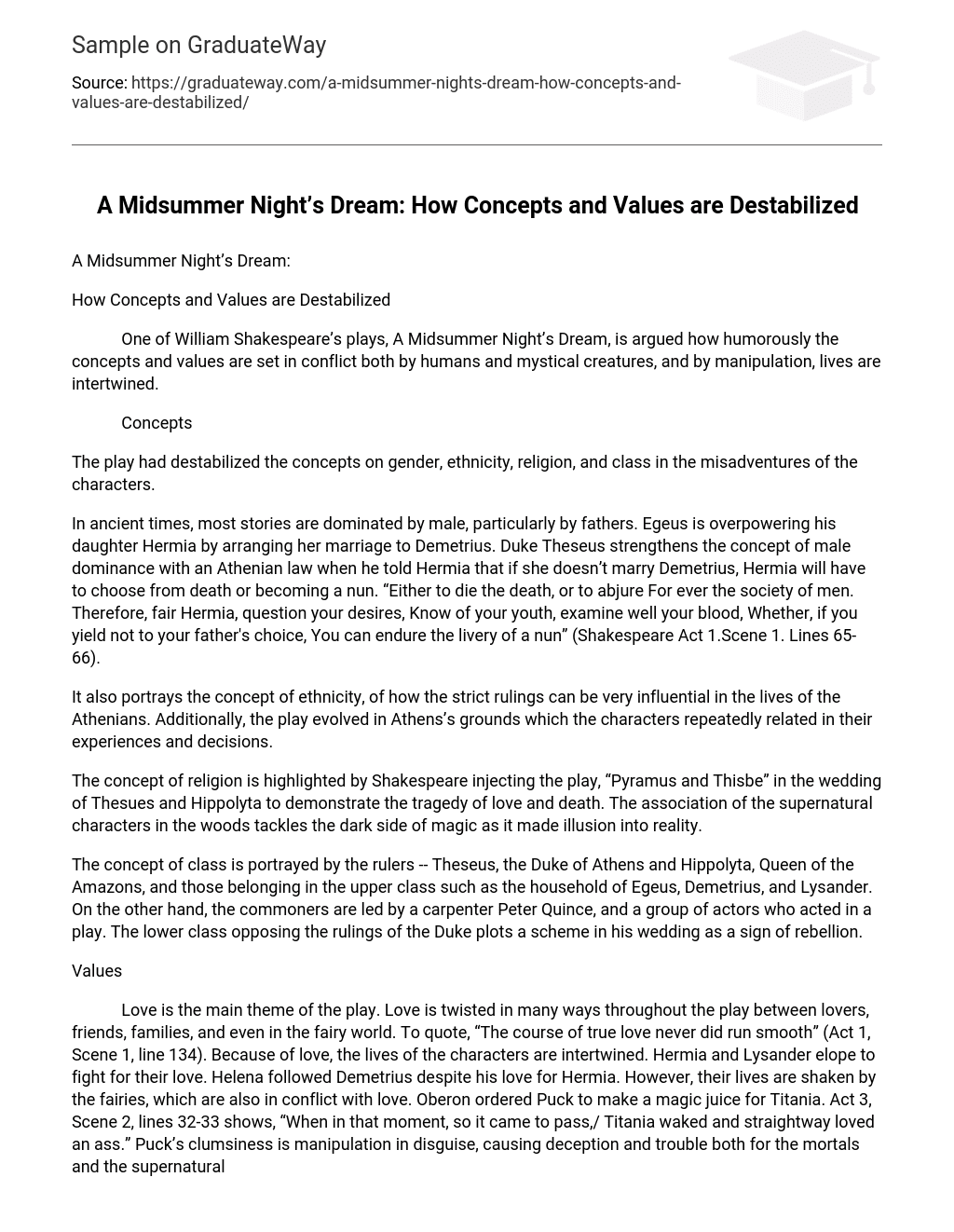A Midsummer Night’s Dream:
How Concepts and Values are Destabilized
One of William Shakespeare’s plays, A Midsummer Night’s Dream, is argued how humorously the concepts and values are set in conflict both by humans and mystical creatures, and by manipulation, lives are intertwined.
Concepts
The play had destabilized the concepts on gender, ethnicity, religion, and class in the misadventures of the characters.
In ancient times, most stories are dominated by male, particularly by fathers. Egeus is overpowering his daughter Hermia by arranging her marriage to Demetrius. Duke Theseus strengthens the concept of male dominance with an Athenian law when he told Hermia that if she doesn’t marry Demetrius, Hermia will have to choose from death or becoming a nun. “Either to die the death, or to abjure For ever the society of men. Therefore, fair Hermia, question your desires, Know of your youth, examine well your blood, Whether, if you yield not to your father’s choice, You can endure the livery of a nun” (Shakespeare Act 1.Scene 1. Lines 65-66).
It also portrays the concept of ethnicity, of how the strict rulings can be very influential in the lives of the Athenians. Additionally, the play evolved in Athens’s grounds which the characters repeatedly related in their experiences and decisions.
The concept of religion is highlighted by Shakespeare injecting the play, “Pyramus and Thisbe” in the wedding of Thesues and Hippolyta to demonstrate the tragedy of love and death. The association of the supernatural characters in the woods tackles the dark side of magic as it made illusion into reality.
The concept of class is portrayed by the rulers — Theseus, the Duke of Athens and Hippolyta, Queen of the Amazons, and those belonging in the upper class such as the household of Egeus, Demetrius, and Lysander. On the other hand, the commoners are led by a carpenter Peter Quince, and a group of actors who acted in a play. The lower class opposing the rulings of the Duke plots a scheme in his wedding as a sign of rebellion.
Values
Love is the main theme of the play. Love is twisted in many ways throughout the play between lovers, friends, families, and even in the fairy world. To quote, “The course of true love never did run smooth” (Act 1, Scene 1, line 134). Because of love, the lives of the characters are intertwined. Hermia and Lysander elope to fight for their love. Helena followed Demetrius despite his love for Hermia. However, their lives are shaken by the fairies, which are also in conflict with love. Oberon ordered Puck to make a magic juice for Titania. Act 3, Scene 2, lines 32-33 shows, “When in that moment, so it came to pass,/ Titania waked and straightway loved an ass.” Puck’s clumsiness is manipulation in disguise, causing deception and trouble both for the mortals and the supernatural characters. Misplaced love also exploits sexuality when Titania falls in love with an ass, Bottom under a spell.
In lieu of honor, Egeus’ desire to be an honorable man can be seen when he tries to obey the Athenian law on marriage. In order to retain honor in his name, he even asked his friend who is the Duke of Athens, just to make sure Hermia would follow. In Act 1, Scene 1, Line 1, Egeus runs to Theseus for help in this matter. In addition, the men of the play wanted badly to retain their honor, even if it means sacrificing the welfare of others.
Loyalty is dismantled between friends when Hermia, Helena, Demetruis, and Lysander fall into Puck’s crazy antics using the magic juice. Helena displays her disloyalty when she plans to tell Demetrius the plan of Hermia and Lysander to elope despite her friendship with the two. Peter Quince’s leadership to the common people depicts treachery to the Duke of Athens.





